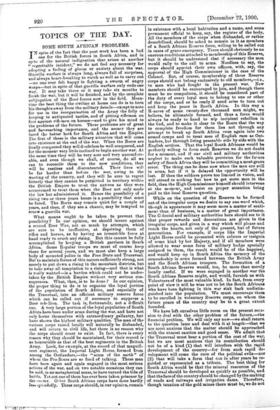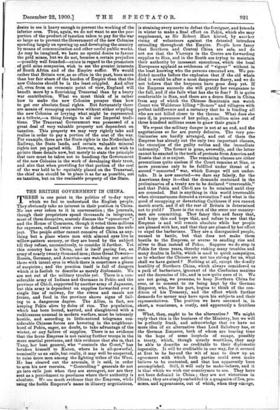TOPICS OF THE DAY.
SOME SOUTH AFRICAN PROBLEMS.
IN spite of the fact that the past week has been a bad one for the British forces in South Africa, and in spite of the natural indignation that arises at another " regrettable incident," we do not feel any necessity for adopting a feeling of gloom or anxiety about the war. Guerilla warfare is always long, always full of surprises, and always heart-breaking to watch as well as to carry out —no one ever felt happy in fighting a swarm of angry wasps—but in spite of that guerilla warfare only ends one way. It may take three or it may take six months to finish the war, but it will be finished, and by the complete subjugation of the Boer forces now in the field. Mean- time the best thing the civilian at home can do is to turn his thoughts away from the military details—except to note for use in the reorganisation of the Army the folly of keeping to antiquated tactics, and of pitting riflemen on foot against riflemen on horses—and to give his mind to the problems of the future. These problems are of great and far-reaching importance, and the sooner they are faced the better both for South Africa and the Empire. The first of these is the military situation that will come into existence at the end of the war. When the Boers are finally conquered they will doubtless be well conquered, and for the moment very little inclined to begin another war. At the same time they will be very sore and very uncomfort- able, and even though we shall, of course, do all we can to reconcile them to the new conditions, they will be restless and discontented. Their lives will be far harder than before the war, owing to the wasting of the country, and they will be sure to regret bitterly that they cannot be permitted in territory within the British Empire to treat the natives as they were accustomed to treat them when the Boer not only made the law but administered it. Hence the possibility of a rising two or three years hence is a possibility that must be faced. The Boers may remain quiet for a couple of years, and then, if they see a chance, may be tempted to renew a guerilla war.
What means ought to be taken to prevent that possibility ? In our opinion, we should insure against a second Boer War, not so much by attempts, which are sure to be ineffective, at depriving them of rifles and horses, as by having an irresistible force at hand ready to crush any rising. But this cannot be fully accomplished by keeping a British garrison in South Africa. Some Regular troops we must of course keep there for several years, and we must also keep a large body of mounted police in the Free State and Transvaal. But to maintain forces of this nature sufficiently strong, not merely to put down a rising in the mountain districts, but to take away all temptation to a rising—and that is what is really wanted—is a burden which could not be under- taken by the British Empire without very serious con- sequences. What, then, is to be done ? In our opinion, the proper thing to do is to organise the loyal portion of the population of South Africa, and especially of the Transvaal, into an efficient military reserve force which can be called out if necessary to suppress a Boer rebellion. The task is, fortunately, not a difficult one. A very large portion of the loyal population of South Africa have been under arms during the war, and have not only borne themselves with extraordinary gallantry, but have shown the highest military qualities. The men of the various corps raised locally will naturally be disbanded, and will return to civil life, but there is no reason why the corps should cease to exist. In fact, there is every reason why they should be maintained, for their record is as honourable as that of the best regiments in the British Army. Look, for example, at the record of that magnifi- cent regiment, the Imperial Light Horse, formed from among the Outlanders,—the " scum of the earth" of whom the Pro-Boers are so fond of talking. These men have been again and again engaged in the most serious actions of the war, and on two notable occasions they can be said, in no metaphorical sense, to have turned the tide of battle. Yet not one of them has ever been taken prisoner by the enemy. Other South African corps have done hardly lees splendidly. These corps should, in our opinion, remaiu though taxation of the gold mines there must be, we do not in existence with a local habitation and a name, and some permanent official to keep, say, the register of the body. All the members of the corps when disbanded, or rather demobilised, should be asked to remain in it as members of a South African Reserve force, willing to be called out in cases of grave emergency. There should obviously be no onerous conditions attached to membership of this Reserve, but it should be understood that if necessary the men would rally to the call to arms. Needless to say, the corps should appoint their own officers, with, say, the approval of the High Commissioner in the case of the Colonel. But, of course, membership of these Reserve corps should not belong exclusively to old members,—i e., to men who had fought in the present war. New members should be encouraged to join, and though there must be no compulsion, it should be considered part of the duty of every loyal man to belong to one or other of the corps, and so be ready if need arise to turn out and keep the peace in South Africa. In this way a R-serve of some twenty-five thousand men might, we believe, be ultimately formed, and thus a force would always be ready to hand to nip incipient rebellion in the bud, and to make it clear to the Boers that the way to complete freedom for them lies not through any attempt to break up South Africa once again into two armed camps and to treat men of English race as Out- lenders, but through living peaceably side by side with the English settlers. That the loyal South Africans would be perfectly willing to form such Reserves we do not doubt for a moment, and if our civil and military authorities neglect to make such valuable provision for the future safety of South Africa they will be committing a most grave error. The thing can be done now when the men are still in arms, but if it is delayed the opportunity will be lost. If then the soldiers prove too limited in vision, and will attend to nothing but how to get more men in the field, then the High Commissioner himself should intervene at the moment, and insist on proper attention being paid to the local Reserve question.
While on the question of the Reserve to be formed out of the irregular corps we desire to say one word which, though in appearance it may seem more a matter of senti- ment, than of business, is a matter of great importance. The C.Ionial and military authorities here should see to it that proper rewards and decorations are given to the irregular corps, and given in a way which will please and touch the hearts, not only of the present, but of future generations. For example, if corps like the Imperial Light Horse could be presented with colours or insignia of some kind by her Majesty, and if all members were allowed to wear some form of military badge specially assigned to them, the result would be of the happiest, and would keep up in South Africa the memory of the comradeship in arms formed between the British Army and the South African troopers. The formation of a South African Reserve would, too, be more than merely locally useful. If we were engaged in another war the South African Reserve might, and would, furnish us with Volunteers of the most valuable kind. In fact, from every point of view it will be wise not to let the South Africans who have been fighting in this war sink back undistin- guished into the population. We must encourage them to be enrolled in voluntary Reserve corps, on whom the future peace of the country may be to a great extent founded.
We have left ourselves little room on the present occa- sion to deal with the other problem of the future,—the financial problem. We will only say now—we shall return to the question later and deal with it at length—that we are most anxious that the matter should be approached with the utmost caution and good sense. We admit that the Transvaal must bear a portion of the cost of the war, but we are most anxious that its contribution should not be of a kind (1) that will interfere with the rapid development of the country—for from such rapid de- velopment will come the cure of the political evils—nor (2) that will take a form that can in after years be re- garded or represented as a tribute. The best thing for South Africa, would be that the mineral resources of the Transvaal should be developed as quickly as possible, and that thefaceof the country should be changed by the making of roads and railways and irrigation dams. Therefore, desire to see it heavy enough to prevent the working of the inferior ores. Thus, again, we do not want to see the pro- portion of the product of taxation taken to pay for the war so large as to prevent the Government of the new Colonies spending largely on opening up and developing the country by means of communication and other useful public works. As may be imagined, we have no special desire to favour the gold mines, but we do not, because a certain prejudice —possibly well founded—exists in regard to the promoters of gold mine companies, wish to see the greater interests of South Africa and of the Empire suffer. We would rather that Britain now, as so often in the past, bore more than her fair share of the burden of Empire than that the new Colonies should be in the least crippled. And after all, even from an economic point of view, England will benefit more by a flourishing Transvaal than by a heavy war contribution. What we must think of is rather how to make the new Colonies prosper than bow to get our absolute fiscal rights. But fortunately there are means of recouping ourselves without either crippling the new Colonies or levying what might be represented as a tribute,—a thing foreign to all our Imperial tradi- tions. The Transvaal Government was possessed of a great deal of very valuable property not dependent on taxation. This property we may very rightly take and realise in order to pay a portion of the cost of the war. For example, there are the State rights in the Netherlands Railway, the State lands, and certain valuable mineral rights not yet parted with. However, we do not wish to go into these details now, but merely to state the principle that care must be taken not to handicap the Government of the new Colonies in the work of developing their trust, and also that when providing for that portion of the cost of the war held to be equitably placed on the Transvaal, the chief aim should be to place it as far as possible, not on taxation, but on the realisable property of the State.







































 Previous page
Previous page